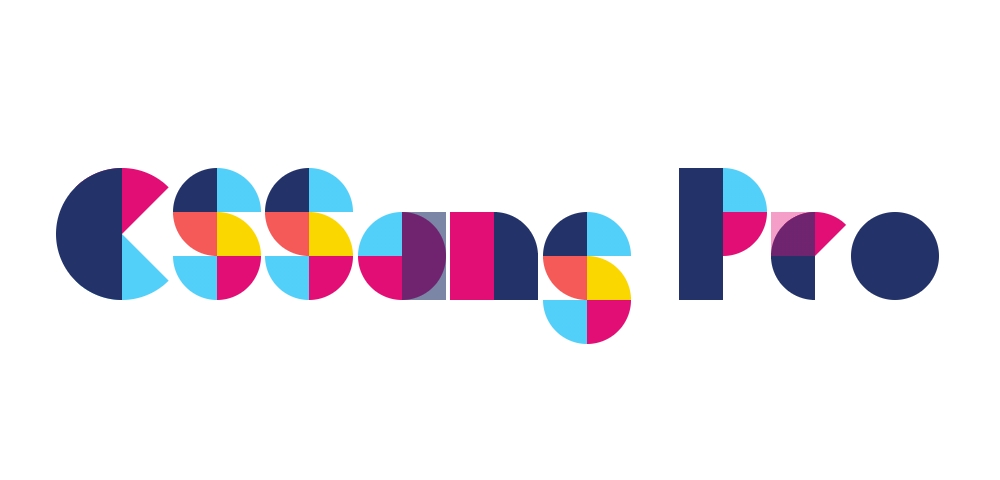
CSSans Pro is a just-for-fun CSS project by Andronache Izabela and Codrin Pavel.
- Overview - all characters & CSS classes
- Quick Start - Get CSSans Pro up and running in seconds
- Quick Start - JavaScript Version - Let JS do the writing
- Options
- Browser Support - How to use without CSS variables
- Accessibility - Super, super important
- Installation - Instructions for running this repo locally
- A - Z
<b class="cssans:LETTER"></b>
- a - z
<b class="cssans:letter"></b>
- 0 - 9
<b class="cssans:NUMBER"></b>
- !~,.*()?@:;'-+=/&$#_
<b class="cssans:CHARACTER"></b>
- `
<b class="cssans:%60"></b> - ^
<b class="cssans:%5E"></b> - %
<b class="cssans:%25"></b> - [
<b class="cssans:%5B"></b> - ]
<b class="cssans:%5D"></b> - {
<b class="cssans:%7B"></b> - }
<b class="cssans:%7D"></b> - "
<b class="cssans:%22"></b> - <
<b class="cssans:%3C"></b> - >
<b class="cssans:%3E"></b> - \
<b class="cssans:%5C"></b> - |
<b class="cssans:%7C"></b>
Grab the minified CSS file from the repo:
Add in some example HTML markup:
<div class="cssans cssans--center">
<div class="cssans__accessible">CSSans Pro</div>
<div class="cssans__word">
<b class="cssans:C"></b>
<b class="cssans:S"></b>
<b class="cssans:S"></b>
<b class="cssans:a"></b>
<b class="cssans:n"></b>
<b class="cssans:s"></b>
</div>
<div class="cssans__word">
<b class="cssans:P"></b>
<b class="cssans:r"></b>
<b class="cssans:o"></b>
</div>
</div>... profit!
Here's a quick breakdown:
- Each character is a single element with a class of
cssans:CHAR - Each individual word goes inside a
.cssans__wordcontainer. This will make sure all text is being spaced properly. - For improved accessibility, you should add the original text in a
.cssans__accessiblecontainer. Definitely read this - CSSans Pro provides some options and built-in helper classes such as
.cssans--center. See more Options
Grab the minified CSS and JS files from the repo:
Add in some example HTML markup:
<div id="foo">CSSans Pro</div>Call CSSans(element, text)
var element = document.getElementById('foo');
var text = element.innerText;
CSSans(element, text);You can grab the unminified CSSans() function from
/_src/cssans/js/cssans.jsto see what's going on in there. Nothing much, really, feel free to make your own.
The color pallete is controlled by 5 CSS variables written as --cssans-**WHICHCOLOR**: **R**, **G**, **B**.
This notation uses only the color values, without the rgb() syntax.
--cssans-primary: 31, 51, 104; // blue
--cssans-secondary: 237, 21, 118; // pink
--cssans-accent1: 43, 208, 247; // light blue
--cssans-accent2: 255, 92, 92; // orange
--cssans-accent3: 255, 216, 9; // yellow--cssans-letter-spacing: 0.1em;--cssans-word-spacing: 1em;--cssans-line-height: 1.1em;Use the cssans--center class on the container that holds your font markup.
This class will make sure all words align properly in the middle of the parent container.
Simply setting
text-align:center;won't do quite as well since words are separated by margins.
<div class="cssans--center">
<div class="cssans__word">...</div>
</div>Use the cssans--right class on the container that holds your font markup.
This class will help you properly align text to the right side of the parent container.
<div class="cssans--right">
<div class="cssans__word">...</div>
</div>Use the cssans--slanted class on the container that holds your font markup to give the font an italicized look.
Note: this class literally adds transform: skew(-15deg); to each .cssans__word. Feel free to experiment 👍
<div class="cssans--slanted">
<div class="cssans__word">...</div>
</div>CSSans Pro can work on older browsers that don't support CSS Custom Properties. Here's a few ways to do that, pick the one that suits best:
-
Use the prebuilt IE compatible version of CSSans Pro
/dist/cssans.min.ie.css- this file contains no CSS Variables, all the code is precompiled to normal CSS properties. Feel free to find/replace all colors and spacings you'd like to customize. -
Install the repo locally and build your own version of
cssans.min.ie.cssor... -
Use a polyfil, such as css-vars-ponyfill
You don't need to read this if you use the
CSSans()JavaScript function.
CSSans Pro is made out of CSS shapes that screen readers and other assistive technologies cannot identify.
In order to keep your site accessible, please use the built-in .cssans__accessible class. It's really easy, look:
<div class="cssans__accessible">I can be read by a screen reader, hurray!</div>-
You will need a working
Jekyllenvironment andNPMinstalled on your machine. Once you have installed NPM, you will need to installgulpinto your global root directory if you haven't already withnpm install -g gulp. Make sure these are working on your system before proceeding. -
Clone the repo
-
Install dependencies with
npm install -
Run
gulp
At this point, BrowserSync should open a new browser tab at http://localhost:3000 and you're good to go!
The repository contains all the files for CSSans Pro, as well as the presentation site.
You can find the font files under _src/cssans/sass/. All the CSS Custom Properties are set in _common.scss.
The dist directory should update on-the-fly as you update the files, so you can grab the minified files from the _dist folder as soon as you finish editing.
Have fun!